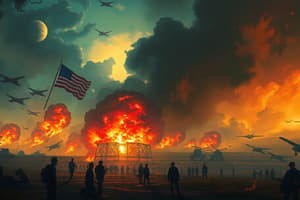Podcast
Questions and Answers
¿Qué evento provocó que Estados Unidos entrara en la Segunda Guerra Mundial?
¿Qué evento provocó que Estados Unidos entrara en la Segunda Guerra Mundial?
- El ataque a la base naval de Pearl Harbor (correct)
- El fin de la guerra
- La liberación de Francia
- La invasión del Día D
¿Cuál fue la importancia del Día D durante la Segunda Guerra Mundial?
¿Cuál fue la importancia del Día D durante la Segunda Guerra Mundial?
- Fue una derrota significativa para las fuerzas aliadas
- Marcó el fin de la guerra
- Permitió la liberación de Europa occidental del control nazi (correct)
- Fue una batalla naval en el Pacífico
¿Qué acción llevó a cabo el presidente Harry Truman en abril de 1945 que significó el fin de la Segunda Guerra Mundial?
¿Qué acción llevó a cabo el presidente Harry Truman en abril de 1945 que significó el fin de la Segunda Guerra Mundial?
- Convocó a una conferencia de paz en Berlín
- Declaró la retirada de las tropas estadounidenses
- Anunció la invasión de Japón
- Anunció el lanzamiento de bombas atómicas en Hiroshima y Nagasaki (correct)
¿Por qué se considera al Día D como un momento icónico en la historia militar?
¿Por qué se considera al Día D como un momento icónico en la historia militar?
¿Qué consecuencia tuvo el ataque a Pearl Harbor en relación con China?
¿Qué consecuencia tuvo el ataque a Pearl Harbor en relación con China?
¿En qué año Alemania invadió Polonia, marcando el comienzo de la Segunda Guerra Mundial?
¿En qué año Alemania invadió Polonia, marcando el comienzo de la Segunda Guerra Mundial?
¿Qué naciones formaron las dos alianzas militares opuestas durante la Segunda Guerra Mundial?
¿Qué naciones formaron las dos alianzas militares opuestas durante la Segunda Guerra Mundial?
¿Por qué la Batalla de Inglaterra fue un punto de inflexión crítico en la Segunda Guerra Mundial?
¿Por qué la Batalla de Inglaterra fue un punto de inflexión crítico en la Segunda Guerra Mundial?
¿Qué factores contribuyeron a la inestabilidad política a largo plazo que condujo a la Segunda Guerra Mundial?
¿Qué factores contribuyeron a la inestabilidad política a largo plazo que condujo a la Segunda Guerra Mundial?
¿Cómo influyó la invasión de Polonia en las decisiones de Reino Unido y Francia durante la Segunda Guerra Mundial?
¿Cómo influyó la invasión de Polonia en las decisiones de Reino Unido y Francia durante la Segunda Guerra Mundial?
Flashcards are hidden until you start studying
Study Notes
World War II: A Global Conflict
World War II was a global conflict that lasted from 1939 to 1945. It involved most of the world's nations—including all of the great powers—forming two opposing military alliances: the Allies and the Axis Powers. This war had its roots in the aftermath of World War I, with resentment over treaty terms and territorial losses leading to long-term political instability. Here are some of the key events that shaped this devastating conflict:
The Invasion of Poland
On September 1st, 1939, Germany invaded Poland, marking the beginning of World War II. The invasion was swift and brutal, with German forces using their advanced tanks and air power to overwhelm Polish defenses. Within weeks, Poland was completely occupied by Nazi Germany. Britain and France declared war on Germany soon after, despite being unwilling to enter the war.
The Battle of Britain
In 1940, Hitler turned his sights toward western Europe and began planning an assault on England. The country fought back fiercely, particularly during the Battle of Britain, where British pilots took down hundreds of Luftwaffe planes (the German Air Force) in a desperate attempt to maintain control of the skies. The outcome was crucial because if Britain fell, it would have been much easier for Germany to invade other parts of Europe without fear of retaliation. However, Britain won the battle and maintained its independence, which proved to be a critical turning point in the war.
Pearl Harbor
The United States entered the war after Japan attacked the American naval base at Pearl Harbor on December 7th, 1941. This incident led to America joining the global conflict against both the Axis powers and Germany. The attack on Pearl Harbor was significant because it brought the U.S into direct conflict with Japan, and also forced the Japanese government to declare war on China, who had been fighting a prolonged conflict with Japan for years prior to World War II.
D-Day
D-Day (short for "D-Day invasion") is widely considered one of the most important days of World War II. On June 6, 1944, more than 156,000 American, British, and Canadian troops landed along a stretch of coastline in Normandy, France. The operation was successful, allowing for the liberation of Western Europe from Nazi control. D-Day remains an iconic moment in military history for its sheer scale and strategic importance.
End of the War
By mid-1945, with the tide of the war clearly turning against them, the remaining Axis powers were rapidly losing ground. In April 1945, US President Harry Truman announced the dropping of atomic bombs on Hiroshima and Nagasaki, Japan, effectively ending the war. These actions demonstrated the immense destructive power of modern weaponry and marked the end of World War II.
In conclusion, World War II was a complex and multifaceted conflict that involved many nations, changing allegiances, and shifting military strategies. However, through these dramatic events, we can learn lessons about the impact of aggression, the consequences of appeasing aggressors, and the devastating effects of totalitarianism.
Studying That Suits You
Use AI to generate personalized quizzes and flashcards to suit your learning preferences.




